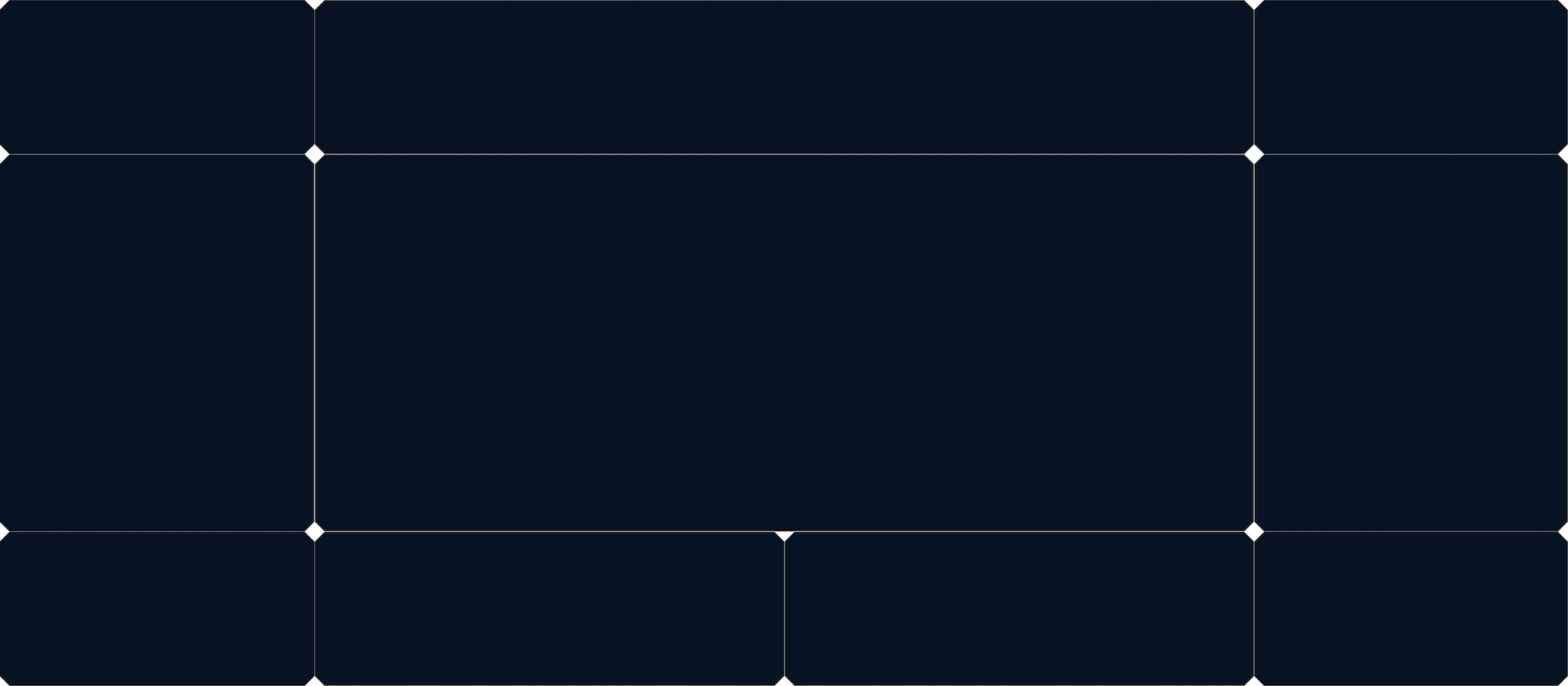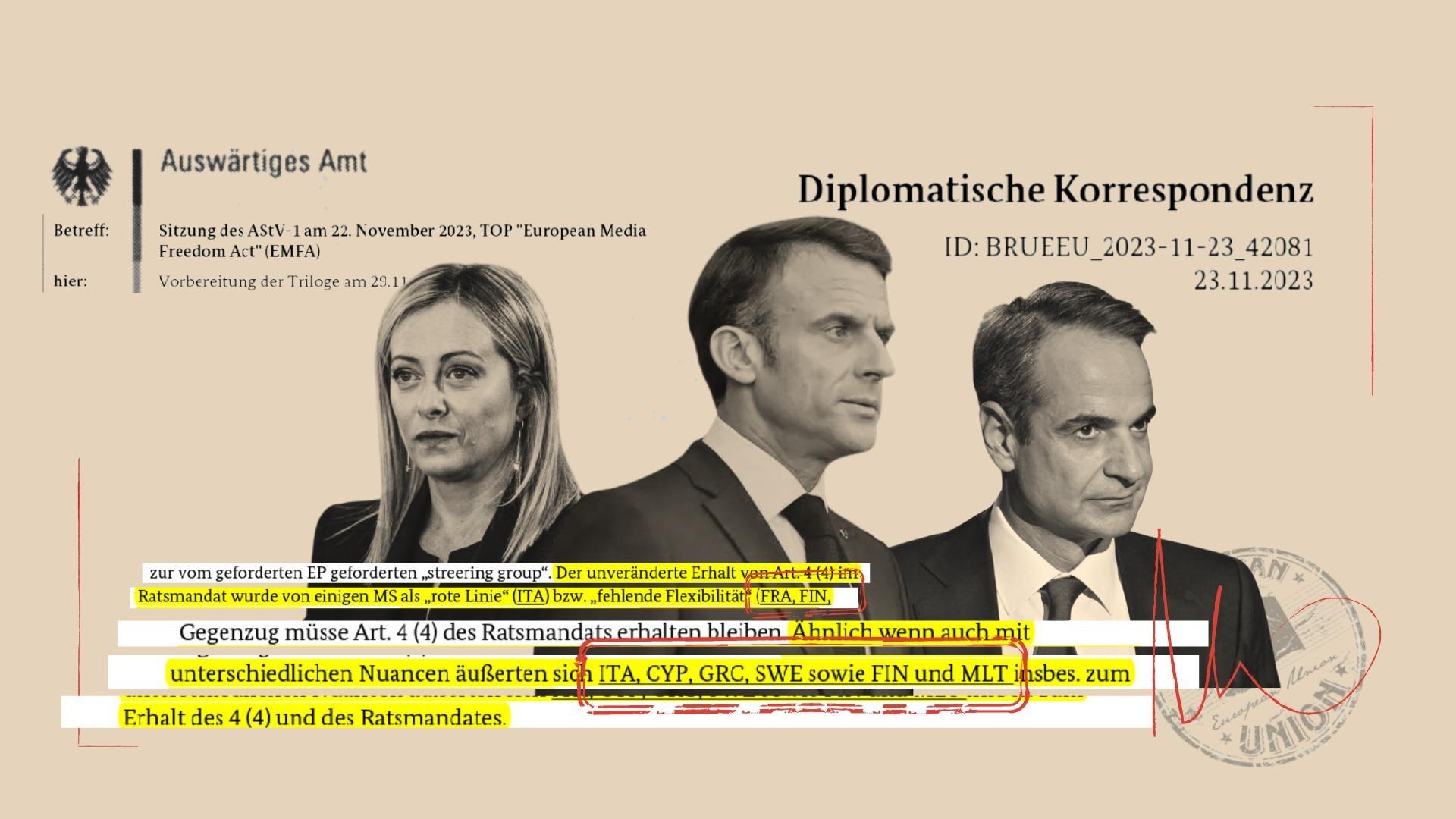
Konstantina Maltepioti
12 December 2023 Pascal Hansens
Pascal Hansens Harald Schumann
Harald Schumann Alexander Fanta
Alexander Fanta Ariane Lavrilleux
Ariane Lavrilleux
Hardline EU governments in late push to legitimise surveillance of journalists

Konstantina Maltepioti
Hardline EU governments in late push to legitimise surveillance of journalists
12 December 2023A planned European law to protect media freedom is in danger of failing due to ongoing pressure from France and six other states to allow spyware use against journalists. The German Government has launched a last-minute rescue attempt.
European governments are still lobbying to legitimise state spying on journalists under a new law designed on paper to protect them, Investigate Europe, Disclose and Follow the Money can reveal.
Documents obtained from a European Council meeting in November show that France, Italy and Greece are among seven governments insisting on broader wording in the European Media Freedom Act (EMFA) which would permit the use of spyware if deemed necessary for “national security”.
The fresh lobbying comes after the European Council published its draft proposal in June, which first included reference to a “national security” exemption. This was met with a wave of criticism from journalists, civil society and MEPs. Reporters Without Borders described it as a “dangerous provision, which would poison the law from within”.
Opposition among parliamentarians has crossed partisan lines. "Governments have no business being on journalists’ phones. We in the European Parliament have made provisions for this. It is unacceptable that member states are now trying to reintroduce this snooping paragraph through the back door," said German Green MEP Daniel Freund, who is involved in the ongoing negotiations.
Right-wing French politician Geoffroy Didier, who has been part of the discussions, has repeatedly asked the Macron government “to abandon their plan to legally spy on journalists. This European regulation must protect pluralism, not authorise spying,” he said.
The European Parliament offered something of an antidote in October when its own draft was published. Its proposal would limit the use of spyware. Surveillance and monitoring of devices would be decided on a case-by-case basis, require an order by an independent judge and could not cover a journalist’s sources or professional activities.
Documents obtained from a European Council meeting in November show that France, Italy and Greece are among seven governments insisting on broader wording in the European Media Freedom Act (EMFA) which would permit the use of spyware if deemed necessary for “national security”.
The fresh lobbying comes after the European Council published its draft proposal in June, which first included reference to a “national security” exemption. This was met with a wave of criticism from journalists, civil society and MEPs. Reporters Without Borders described it as a “dangerous provision, which would poison the law from within”.
Opposition among parliamentarians has crossed partisan lines. "Governments have no business being on journalists’ phones. We in the European Parliament have made provisions for this. It is unacceptable that member states are now trying to reintroduce this snooping paragraph through the back door," said German Green MEP Daniel Freund, who is involved in the ongoing negotiations.
Right-wing French politician Geoffroy Didier, who has been part of the discussions, has repeatedly asked the Macron government “to abandon their plan to legally spy on journalists. This European regulation must protect pluralism, not authorise spying,” he said.
The European Parliament offered something of an antidote in October when its own draft was published. Its proposal would limit the use of spyware. Surveillance and monitoring of devices would be decided on a case-by-case basis, require an order by an independent judge and could not cover a journalist’s sources or professional activities.
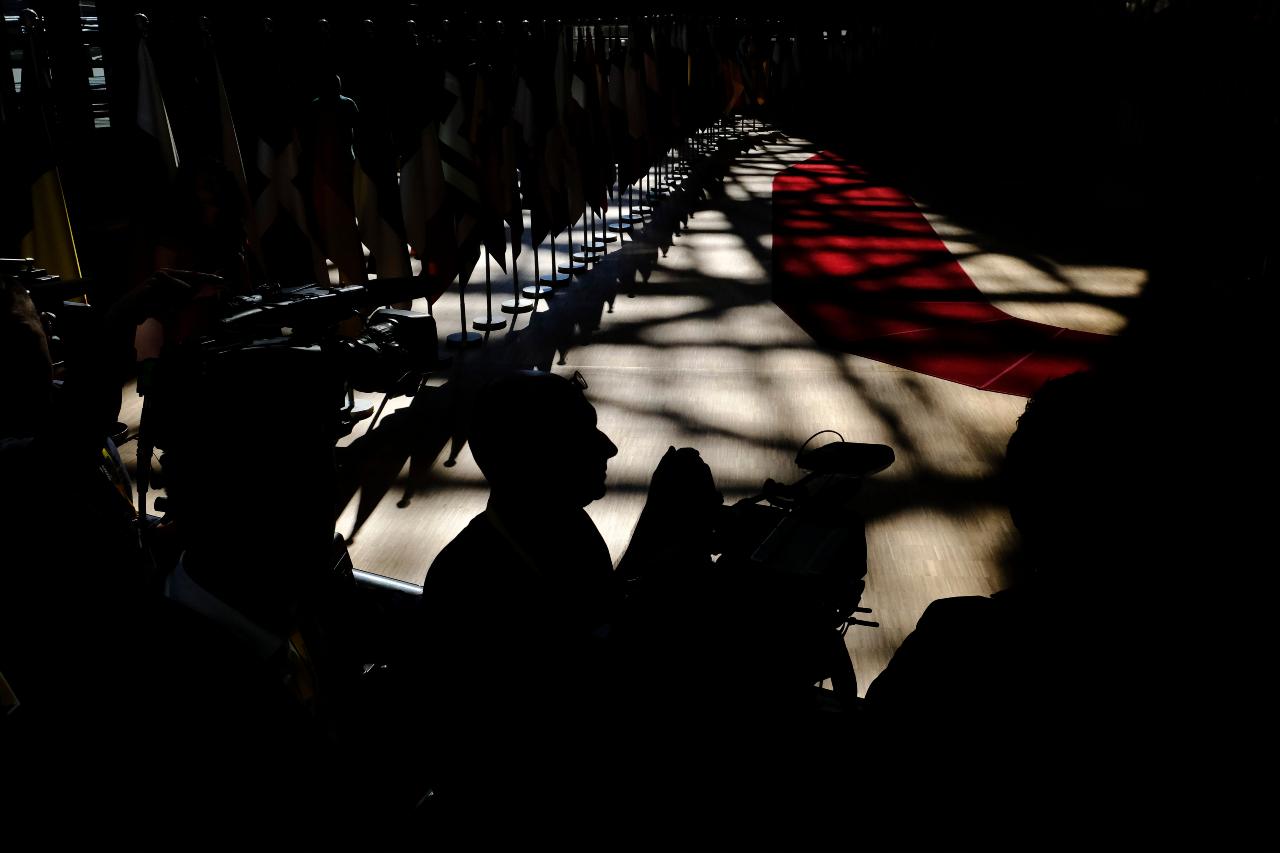
Seven governments are still lobbying to water down the planned European Media Freedom Act.Shutterstock
After 15 months of negotiations, the council and parliament must now broker a final legal text with the European Commission. The decisive ‘trilogue’ meeting is scheduled for Friday 15 December. The two fundamentally different positions will clash on the issue of journalists and their sources being spied on by state authorities.
The protection of whistleblowers "is one of the basic conditions for press freedom", the European Court of Human Rights declared in 2022, adding that without it, "the vital public-watchdog role of the press as guardian of the public sphere may be undermined".
The Council of the EU - which represents the governments of EU member states - adopted its version on 21 June, under pressure from the Macron government and ultimately with the agreement of all governments except Hungary and Poland. It included the contentious sentence to an article banning spying on journalists: "This article shall be without prejudice to the responsibility of Member States to protect national security.”
Critics said the national security amendment, first revealed by Investigate Europe, could grant states a “blank cheque” to conduct surveillance against journalists. But Martin Persson, from Sweden’s Ministry of Culture, whose government chaired the negotiations in the Council, rejected the notion: “This wording adds nothing new, but merely refers to what already applies under the EU Treaty.”
The protection of whistleblowers "is one of the basic conditions for press freedom", the European Court of Human Rights declared in 2022, adding that without it, "the vital public-watchdog role of the press as guardian of the public sphere may be undermined".
The Council of the EU - which represents the governments of EU member states - adopted its version on 21 June, under pressure from the Macron government and ultimately with the agreement of all governments except Hungary and Poland. It included the contentious sentence to an article banning spying on journalists: "This article shall be without prejudice to the responsibility of Member States to protect national security.”
Critics said the national security amendment, first revealed by Investigate Europe, could grant states a “blank cheque” to conduct surveillance against journalists. But Martin Persson, from Sweden’s Ministry of Culture, whose government chaired the negotiations in the Council, rejected the notion: “This wording adds nothing new, but merely refers to what already applies under the EU Treaty.”
“Governments have no business being on journalists’ phones. It is unacceptable that member states are now trying to reintroduce this snooping paragraph through the back door.”
— Green MEP Daniel Freund
The sentence was merely "a clarification that is not intended to establish any new rights of interference in journalistic freedoms," a spokesperson for Claudia Roth, Germany’s Media Minister, said in June.
If that were correct, however, the additional paragraph would make no sense. In fact, it is not true. According to the current EU Treaty, the safeguarding of national security is the sole responsibility of the nation states. However, the European Court of Justice (ECJ) has repeatedly ruled that invoking this principle does not justify breaking EU laws.
In October 2020, for example, ECJ judges prohibited French authorities from forcing internet providers to retain all customer data independent of specific investigations in violation of the EU directive on data protection in electronic communication. "The mere fact that a national measure has been taken to protect national security cannot exempt the member states from the necessary compliance with EU law.”
Because of this defeat, sources in the Commission say, the French government and its fellow campaigners could rely on the national security exemption in the EMFA so that national courts do not refer possible disputes to the ECJ for a ruling. As a result they could decide on their own when the protection of journalists from spying may undermine national security. If so, they may set aside the prohibition to conduct surveillance of journalists.
If that were correct, however, the additional paragraph would make no sense. In fact, it is not true. According to the current EU Treaty, the safeguarding of national security is the sole responsibility of the nation states. However, the European Court of Justice (ECJ) has repeatedly ruled that invoking this principle does not justify breaking EU laws.
In October 2020, for example, ECJ judges prohibited French authorities from forcing internet providers to retain all customer data independent of specific investigations in violation of the EU directive on data protection in electronic communication. "The mere fact that a national measure has been taken to protect national security cannot exempt the member states from the necessary compliance with EU law.”
Because of this defeat, sources in the Commission say, the French government and its fellow campaigners could rely on the national security exemption in the EMFA so that national courts do not refer possible disputes to the ECJ for a ruling. As a result they could decide on their own when the protection of journalists from spying may undermine national security. If so, they may set aside the prohibition to conduct surveillance of journalists.
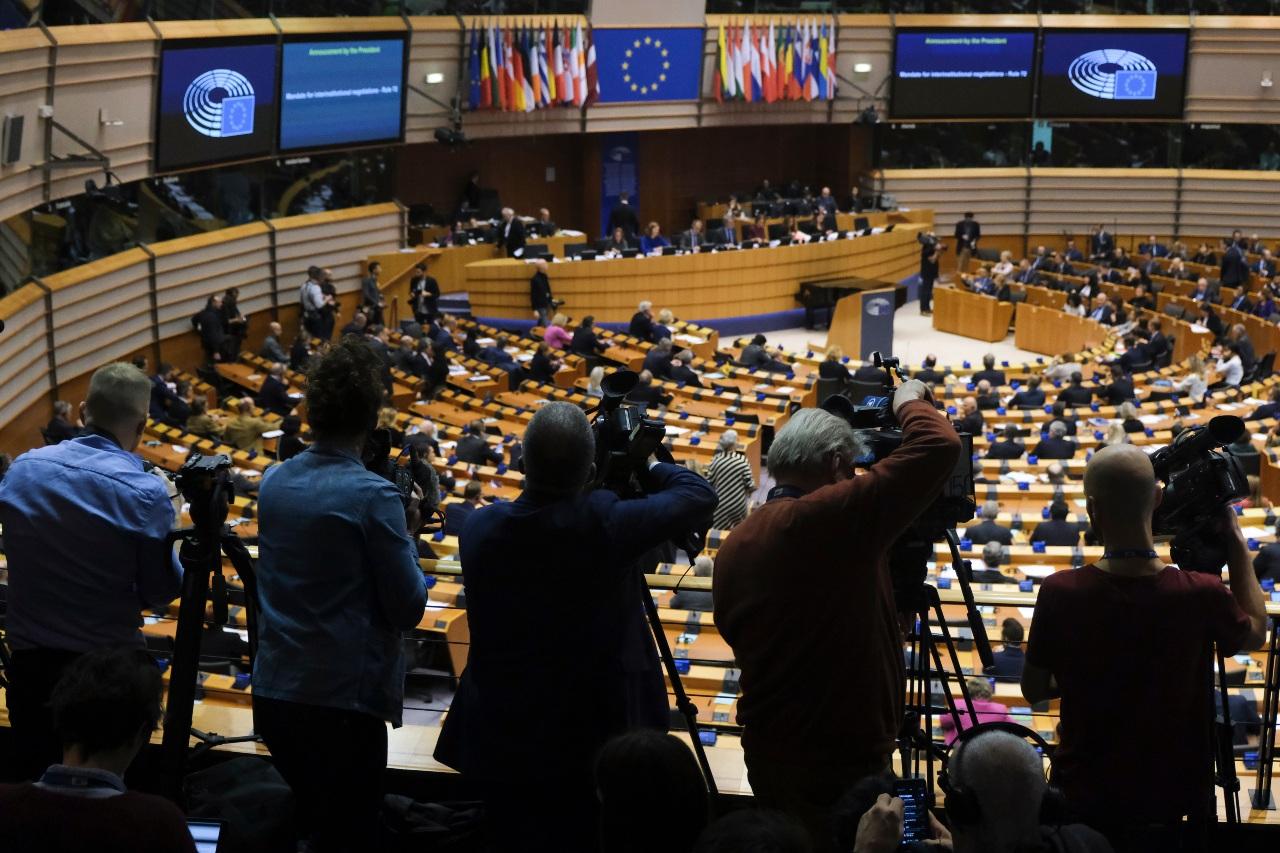
If approved, the EMFA could set important legal safeguards for journalists across Europe.Shutterstock
EU law could then subsequently legitimise how some states have already unlawfully monitored and investigated critical journalists. Governments in Greece, Spain, Bulgaria and Hungary have all invoked national security to justify the use of Pegasus and Predator spyware against journalists. The EU Parliament even set up a special committee of inquiry and called for the sale of spyware to be banned until the exceptional cases in which it is allowed are clearly defined in law.
The prospect of a national security loophole is strongly opposed by journalists and publishers: "We are deeply concerned about the chilling effect that could result if the final text sets conditions for the disclosure of sources that do not comply with international human rights standards," read an open letter published in December by 17 European media associations and institutes.
Minutes from the EU Council of Permanent Representatives meeting on 22 November show that seven states are still pushing for the exemption. Italy said retaining the paragraph was a must and a "red line". The representatives of France, Finland and Cyprus also stated that they were "not very flexible" on this issue. Sweden, Malta and Greece also agreed "with some nuances", according to the document, written by a high-ranking German official present at the meeting.
Only France, Finland and Sweden confirmed their positions in favour of the ‘national security’ provision when contacted for this article.
Among EU governments, only Portugal has openly criticised the national security exception. A spokesperson for the Portuguese representation in Brussels said they were "concerned about the future impact that this provision could have not only on the freedom of journalists to practise their profession, but also on European civil society."
The prospect of a national security loophole is strongly opposed by journalists and publishers: "We are deeply concerned about the chilling effect that could result if the final text sets conditions for the disclosure of sources that do not comply with international human rights standards," read an open letter published in December by 17 European media associations and institutes.
Minutes from the EU Council of Permanent Representatives meeting on 22 November show that seven states are still pushing for the exemption. Italy said retaining the paragraph was a must and a "red line". The representatives of France, Finland and Cyprus also stated that they were "not very flexible" on this issue. Sweden, Malta and Greece also agreed "with some nuances", according to the document, written by a high-ranking German official present at the meeting.
Only France, Finland and Sweden confirmed their positions in favour of the ‘national security’ provision when contacted for this article.
Among EU governments, only Portugal has openly criticised the national security exception. A spokesperson for the Portuguese representation in Brussels said they were "concerned about the future impact that this provision could have not only on the freedom of journalists to practise their profession, but also on European civil society."
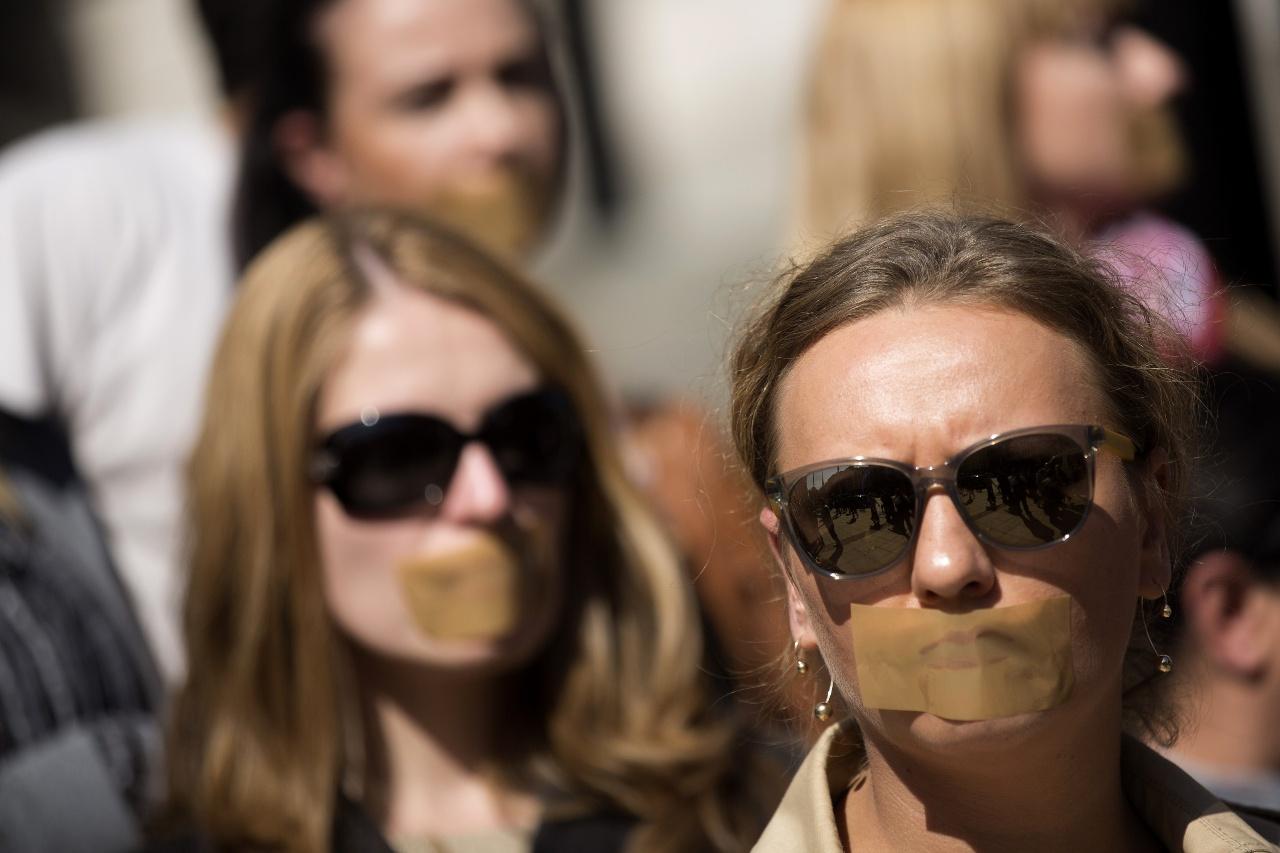
Journalists in Sofia, Bulgaria protest against censorship of the media. Shutterstock
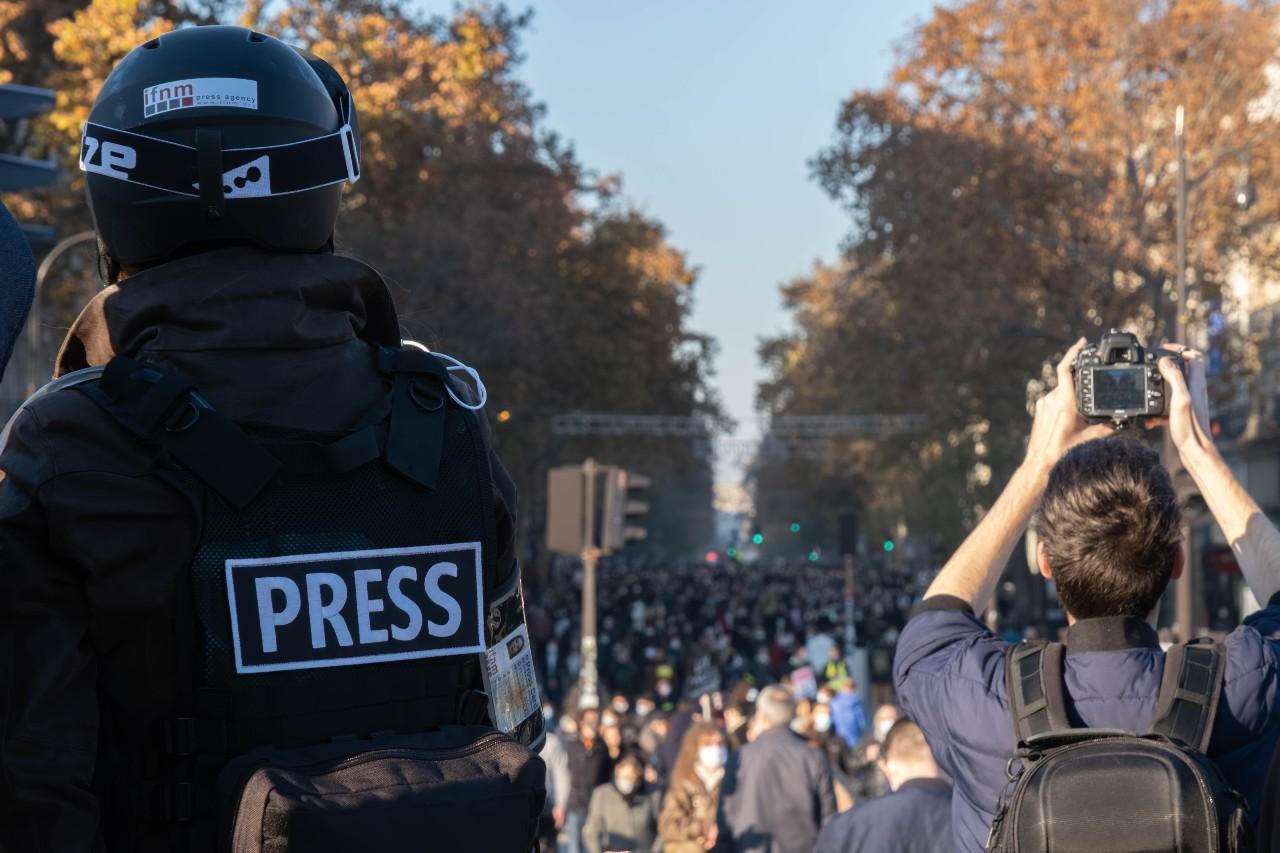
The media in France are under increasing pressure from authorities.Shutterstock
It remains to be seen whether a qualified majority of governments, representing 65 per cent of the EU population, will actually insist on such an exemption in the end or agree to a compromise that safeguards fundamental rights. Although the seven states only represent 34 per cent of the European population, this minority could block any compromise with a so-called blocking minority in the Council, because Hungary rejects the EMFA anyway and together they would represent 36 percent of the EU citizens.
The seven hard-liners in the Council are prepared to make at least some concessions. Together with most member states, they supported the parliament’s October text that journalists’ sources must be protected and getting "the consent of an independent judicial authority" is obligatory if such protection is to be violated. They also signalled that they could support a mechanism to "regularly review the use of surveillance technologies".
However, Christophe Bigot, a lawyer and expert in press law, considers this to be a red herring, at least in the case of France. "Any reference to national security could be enough to prosecute or monitor a journalist," Bigot said. Obtaining prior authorisation from a judge would only be a "change on paper”, as in the case of a preliminary investigation, searches of journalists’ or editorial offices are almost always granted by judges in France.
This was illustrated by recent investigations against the journalists of Disclose. The mere fact that they quoted from secret documents about the involvement of French secret agents in the murder of civilians by security authorities in Egypt was enough for a judge to allow the police to raid the home of one of the authors and confiscate her computers and phones.
The seven hard-liners in the Council are prepared to make at least some concessions. Together with most member states, they supported the parliament’s October text that journalists’ sources must be protected and getting "the consent of an independent judicial authority" is obligatory if such protection is to be violated. They also signalled that they could support a mechanism to "regularly review the use of surveillance technologies".
However, Christophe Bigot, a lawyer and expert in press law, considers this to be a red herring, at least in the case of France. "Any reference to national security could be enough to prosecute or monitor a journalist," Bigot said. Obtaining prior authorisation from a judge would only be a "change on paper”, as in the case of a preliminary investigation, searches of journalists’ or editorial offices are almost always granted by judges in France.
This was illustrated by recent investigations against the journalists of Disclose. The mere fact that they quoted from secret documents about the involvement of French secret agents in the murder of civilians by security authorities in Egypt was enough for a judge to allow the police to raid the home of one of the authors and confiscate her computers and phones.
“Any reference to national security could be enough to prosecute or monitor a journalist.”
— Christophe Bigot, French lawyer
France has led calls for an exemption from the start of the EMFA project, as council documents show. As early as 21 October 2022, the government advocated for an "explicit exclusion clause" for the entire law if national security were to be affected.
Whether the French government prevails depends on the outcome of the upcoming trilogue negotiations. If no agreement is found, the law could fail and media freedoms throughout Europe would remain under attack. If the council hard-liners get their way, the law could contain a dangerous loophole endangering journalists in many countries. But if a compromise is reached, the law would set important minimum standards for press freedom such as the independence of public television from the state and the protection of editorial decisions from external interference.
A source close to the negotiations said the parliament could ultimately accept if member states define a precise list of crimes for which surveillance of journalists could be authorised. But the withdrawal of the broad derogation on the ground of national security remains their “red line”.
To overcome the gridlock between the two sides the German government launched a last-minute effort to save the law. "Minister of State for Media Claudia Roth has succeeded in getting the Federal Government and the federal states to refrain from explicitly mentioning "national security" in the EMFA," said her spokesperson. The official German position now proposes the following wording for the corresponding paragraph: "This Article is without prejudice to the Member States' responsibility for safeguarding the areas for which they are solely responsible".
Whether this will actually solve the problem, even if it is approved by the parliament and council, will likely be decided only by the courts.
Alexander Fanta is a journalist at Follow the Money. Ariane Lavrilleux is a reporter for Disclose.
Editor: Chris Matthews
Illustration: Konstantina Maltepioti/Reporters United
Whether the French government prevails depends on the outcome of the upcoming trilogue negotiations. If no agreement is found, the law could fail and media freedoms throughout Europe would remain under attack. If the council hard-liners get their way, the law could contain a dangerous loophole endangering journalists in many countries. But if a compromise is reached, the law would set important minimum standards for press freedom such as the independence of public television from the state and the protection of editorial decisions from external interference.
A source close to the negotiations said the parliament could ultimately accept if member states define a precise list of crimes for which surveillance of journalists could be authorised. But the withdrawal of the broad derogation on the ground of national security remains their “red line”.
To overcome the gridlock between the two sides the German government launched a last-minute effort to save the law. "Minister of State for Media Claudia Roth has succeeded in getting the Federal Government and the federal states to refrain from explicitly mentioning "national security" in the EMFA," said her spokesperson. The official German position now proposes the following wording for the corresponding paragraph: "This Article is without prejudice to the Member States' responsibility for safeguarding the areas for which they are solely responsible".
Whether this will actually solve the problem, even if it is approved by the parliament and council, will likely be decided only by the courts.
Alexander Fanta is a journalist at Follow the Money. Ariane Lavrilleux is a reporter for Disclose.
Editor: Chris Matthews
Illustration: Konstantina Maltepioti/Reporters United




